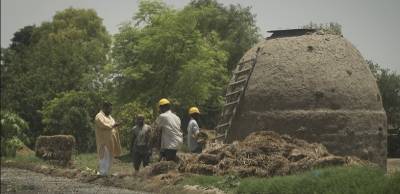NEW DELHI, 23 March 2023: PepsiCo India has extended its Biochar Initiative, a pilot crop residue management program, to the Fatehgarh Sahib and Ludhiana districts of Punjab as a potential solution to address the pressing issue of stubble burning in the northern states of India.
This initiative will continue to work with more farmers in Punjab to better manage harvest residue by using furnaces known as retort kilns to produce biochar fertilizer through a process called pyrolysis.
According to Indian Agricultural Research Institute (IARI), stubble burning in Punjab released 6.8 million tonnes of greenhouse gases and particulate matter between September 15 and November 2, 2022. Biochar production and usage has the potential to reduce GHG emissions significantly compared to other forms of disposal such as heaping while improving soil health and water retention.
PepsiCo India's Biochar Initiative aligns with the United Nations Sustainable Development Goals (SDGs), particularly SDG 13 (Climate Action) and SDG 2 (Zero Hunger). Through these efforts, the company also aims to improve the per hectare crop yields for small and marginal farmers while contributing to global efforts to mitigate climate change.
Speaking about the initiative, Anukool Joshi, Director - Agro at PepsiCo India said, “Enhancing soil function and health using biochar can increase agricultural output and reduce expenses related to nutrient and environmental effects. In comparison to other crop residue management options, our preliminary data has shown increased net benefit to the farmers through the adoption of biochar.”
He further added “Although the Biochar initiative is still in its pilot stage, we think it is a potential solution to the negative impacts of stubble burning on air and soil quality while reducing greenhouse gas emissions in the agricultural supply chain. At PepsiCo India, we are dedicated to introducing sustainable farm practices like biochar that can create a more resilient future for both agriculture and agricultural communities”.
Today, PepsiCo in India works directly and indirectly with over 27,000 farmers across 14 states, sourcing 100 percent of the potatoes for its Lay’s brand in India from Indian farmers.
Naginder Singh, owner of the farm where PepsiCo India commissioned the first retort kiln, highlights the benefits he sees from the adoption of biochar, “PepsiCo India helped us to set up furnaces to produce biochar. After the biochar is prepared, we spread it into the fields that are ready for cultivation. I would recommend biochar to all farmers. Using it helps our soil and saves our environment from further pollution, while reducing the use of chemical fertilizers”.
Driven by PepsiCo Positive (pep+), the company’s strategic, end-to-end business transformation, PepsiCo seeks to build more healthy, sustainable, and inclusive food systems by sourcing crops and ingredients in ways that restore the earth and strengthen farming communities.
By 2030, the company aims to drive the adoption of regenerative farming practices across 7 million acres, improve the livelihoods of more than 250,000 people in its agricultural supply chain, and sustainably source 100 percent of its key ingredients. The latest extension of PepsiCo’s Biochar Initiative is another strong step toward achieving these goals, as the company continues its Positive Agriculture journey across global markets, including India.




















